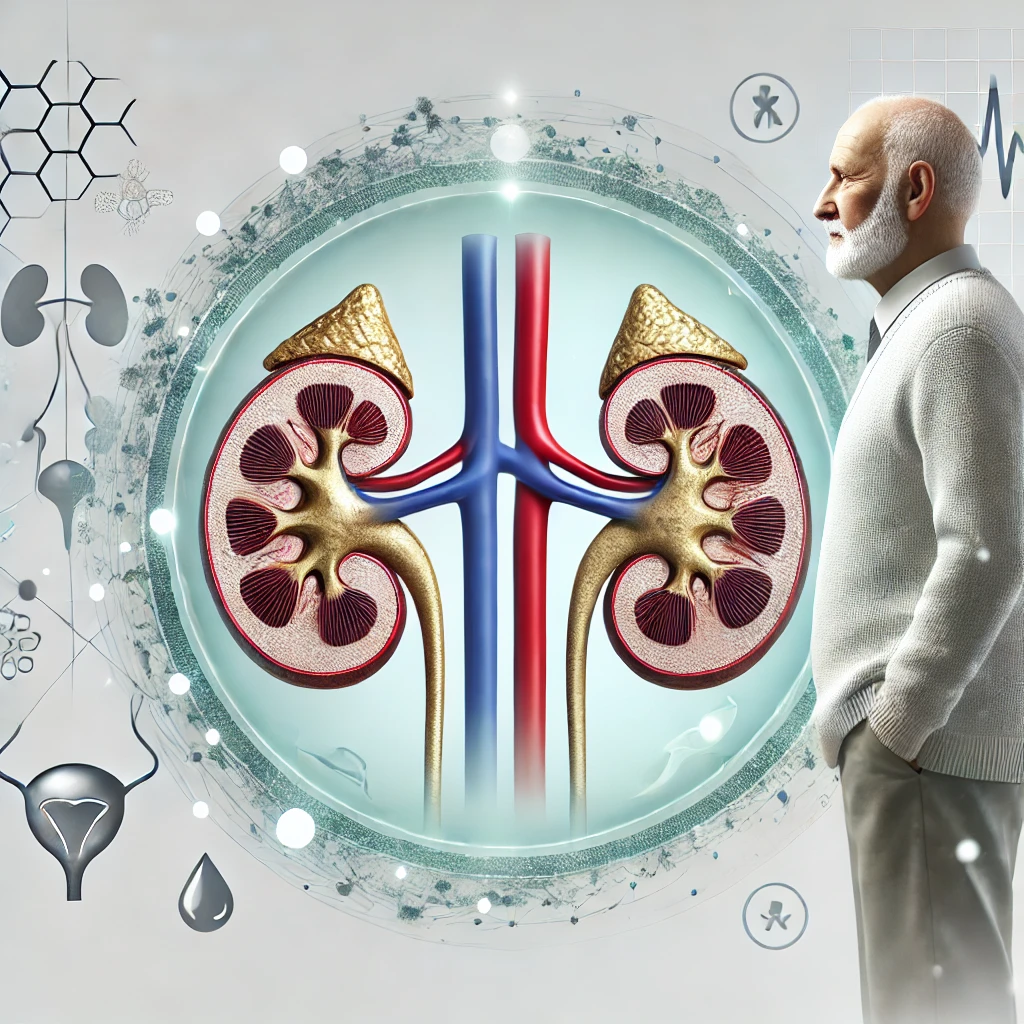As we age, our bodies undergo a range of changes, some of which affect vital organs and systems, including the kidneys and the bladder. These changes can lead to issues with kidney function and bladder control, which are common in older adults. Understanding these changes can help manage and even prevent complications, allowing for a healthier and more comfortable life.
1. Understanding the Aging Kidney
The kidneys play a crucial role in filtering waste products from the blood, balancing body fluids, and regulating blood pressure. As we get older, several changes occur in kidney function, including:
- Reduced Filtration Rate: The glomerular filtration rate (GFR) naturally decreases with age. This means the kidneys become less efficient at filtering waste from the blood.
- Decreased Kidney Size: The size of the kidneys often decreases due to the loss of nephrons, the tiny filtering units in the kidneys, which can affect their overall functionality.
- Increased Risk of Chronic Kidney Disease (CKD): Older adults are at a higher risk of developing CKD, especially if they have conditions like diabetes, high blood pressure, or heart disease. Early stages of CKD might not show any symptoms, making regular screenings essential.
How to Support Kidney Health as You Age:
- Stay Hydrated: Drinking plenty of water can help maintain kidney function and prevent kidney stones.
- Monitor Blood Pressure and Blood Sugar: Managing these factors can significantly reduce the risk of kidney damage.
- Limit Salt Intake: A diet low in sodium can prevent high blood pressure, which is a leading cause of kidney disease.
2. Bladder Control Challenges in Older Adults
Changes in bladder function are also common as people age. The bladder muscles may weaken, and the bladder’s capacity to hold urine may decrease. Some common bladder control issues include:
- Overactive Bladder (OAB): Characterized by a sudden and uncontrollable urge to urinate, OAB can lead to frequent trips to the bathroom and even incontinence.
- Stress Incontinence: This occurs when the bladder leaks urine during physical activities like coughing, sneezing, laughing, or lifting heavy objects. It’s more common in women due to the impact of childbirth and hormonal changes.
- Urge Incontinence: This condition causes a strong, sudden need to urinate with little warning and is often linked to OAB.
Factors Contributing to Bladder Control Issues:
- Hormonal Changes in Women: Menopause leads to a decrease in estrogen, which can weaken the muscles supporting the bladder, leading to incontinence.
- Prostate Problems in Men: An enlarged prostate (benign prostatic hyperplasia, or BPH) is common in older men and can obstruct the flow of urine, leading to bladder issues.
- Neurological Conditions: Conditions like Parkinson’s disease, multiple sclerosis, or stroke can affect the nerves that control the bladder, increasing the risk of incontinence.
3. Tips for Managing Age-Related Bladder Changes
Here are some strategies to help manage bladder control issues and maintain urological health as you age:
- Pelvic Floor Exercises: Strengthening the pelvic floor muscles through Kegel exercises can improve bladder control and reduce the risk of incontinence. These exercises are beneficial for both men and women.
- Bladder Training: Techniques like timed voiding (urinating at regular intervals) and bladder retraining can help increase bladder control and reduce the frequency of bathroom visits.
- Healthy Diet: Reducing caffeine, alcohol, and spicy foods in your diet can help prevent bladder irritation and improve control.
- Stay Active: Regular physical activity supports healthy kidney and bladder function by reducing the risk of obesity, which is a risk factor for incontinence.
4. When to Seek Help
It’s essential to consult a healthcare professional if you notice any significant changes in urination patterns or if you experience symptoms like pain during urination, blood in the urine, or severe incontinence. Early diagnosis and treatment can prevent complications and improve quality of life.
Common Diagnostic Tests:
- Urinalysis: A basic test to check for signs of infection or other abnormalities in the urine.
- Ultrasound or CT Scan: Imaging tests to evaluate the structure of the kidneys and bladder.
- Prostate-Specific Antigen (PSA) Test: A blood test to check for prostate issues in men.
5. Proactive Steps for Maintaining Urological Health
Taking proactive steps can help minimize the impact of age-related changes in kidney and bladder health:
- Regular Check-ups: Regular visits to your healthcare provider for kidney and bladder health assessments are vital, especially if you have underlying conditions like diabetes or hypertension.
- Healthy Lifestyle Choices: A balanced diet, regular exercise, staying hydrated, and avoiding smoking are key to supporting urological health as you age.
- Managing Chronic Conditions: Proper management of chronic conditions like diabetes and heart disease can reduce the risk of developing kidney and bladder issues.
Conclusion
Age-related changes in kidney function and bladder control are a normal part of aging. However, understanding these changes and taking the necessary steps to manage them can make a significant difference in your quality of life. By staying informed and adopting healthy habits, you can support your kidneys and bladder, maintaining optimal health well into your later years. Remember, it’s never too late to start taking care of your urological health!

